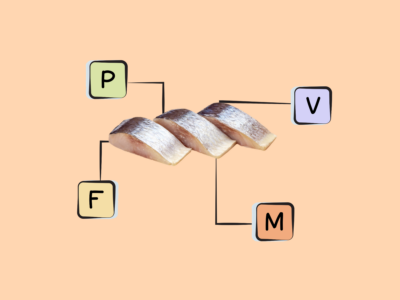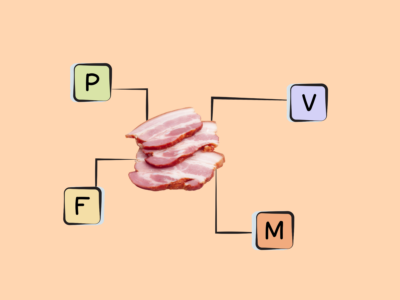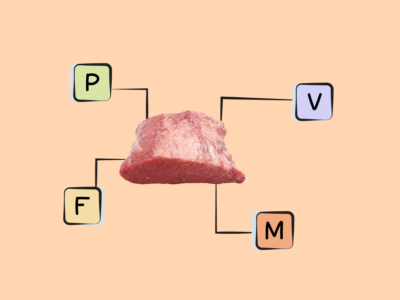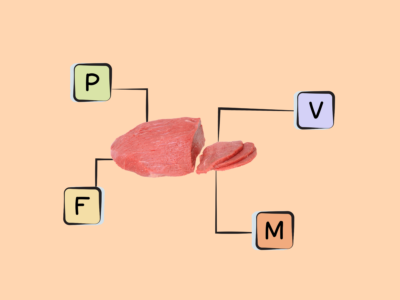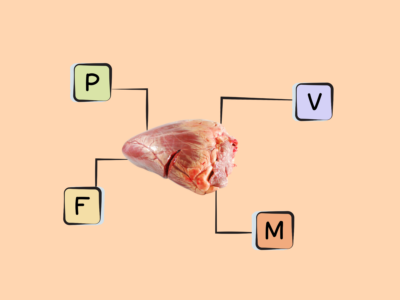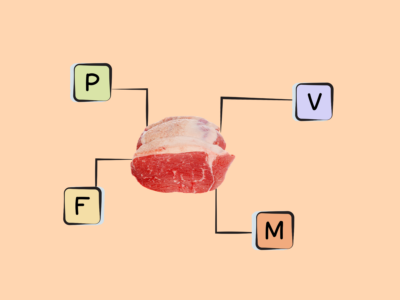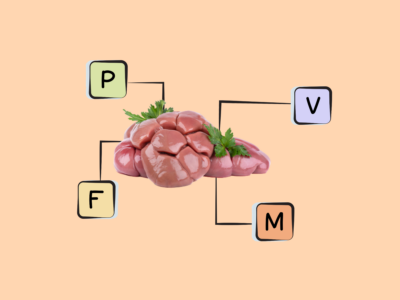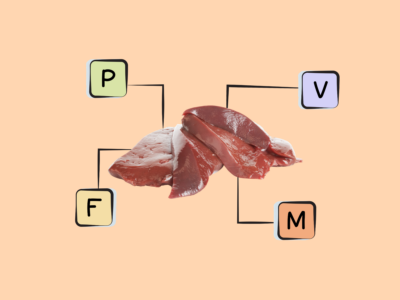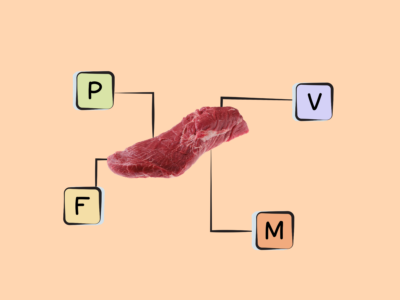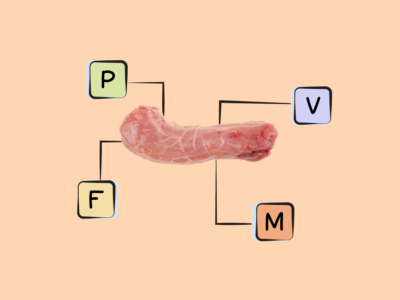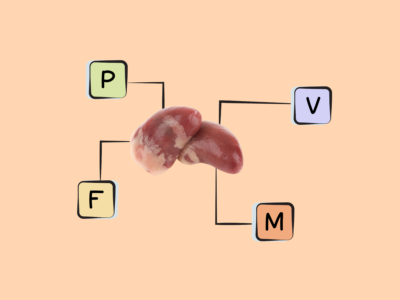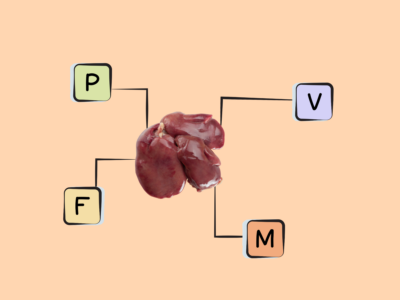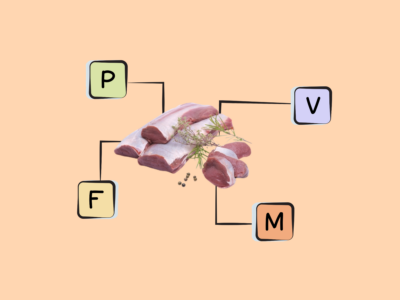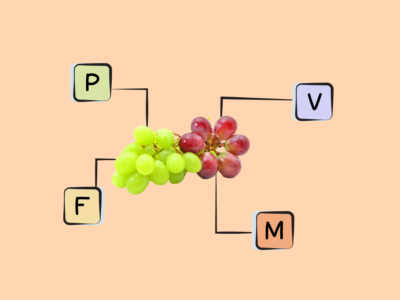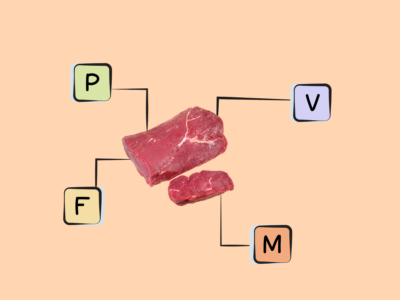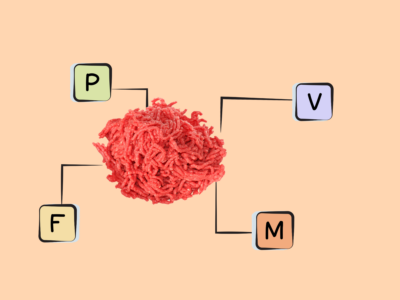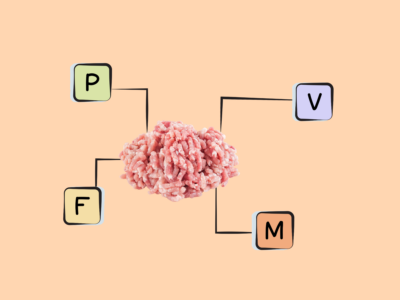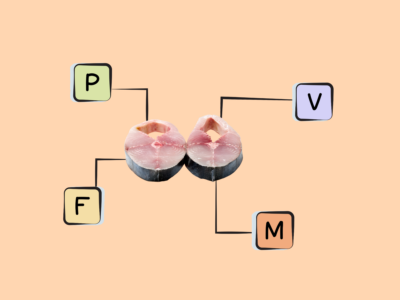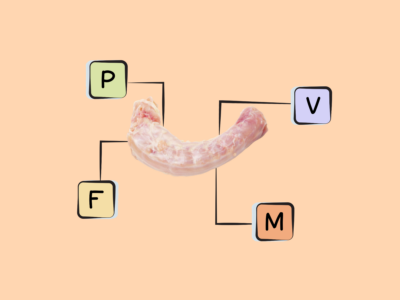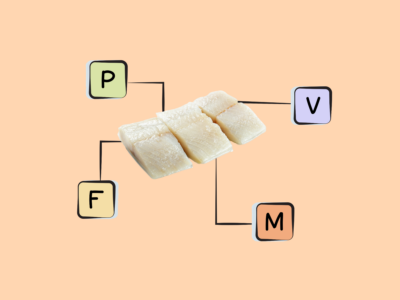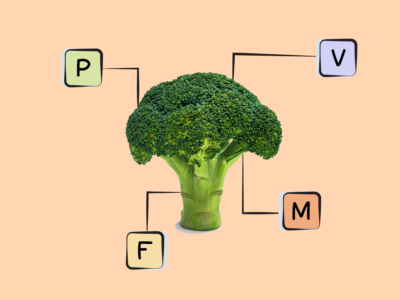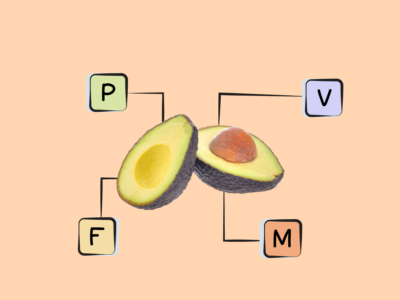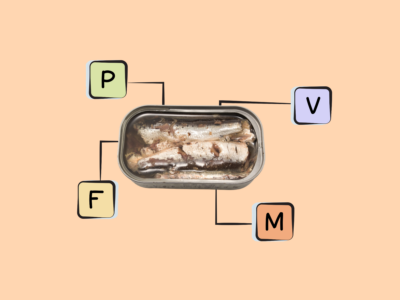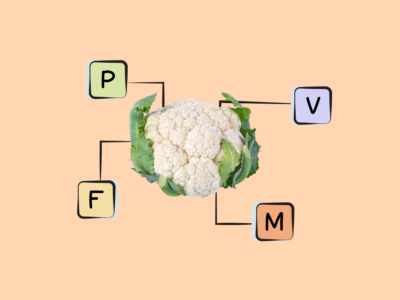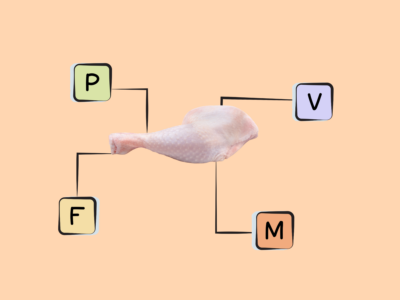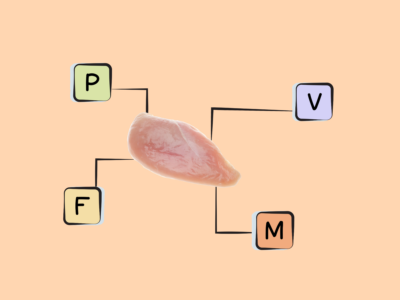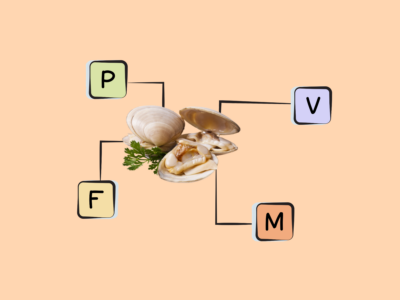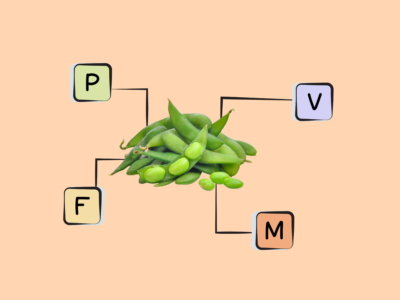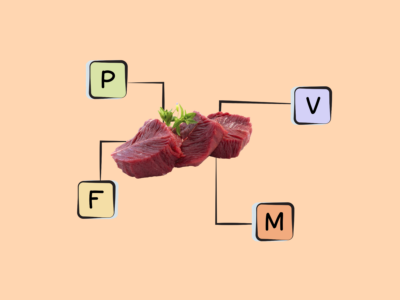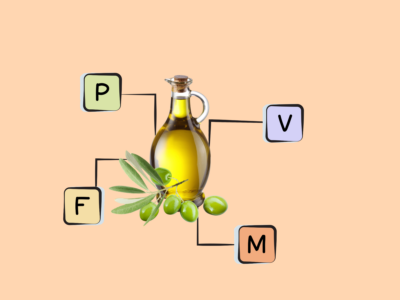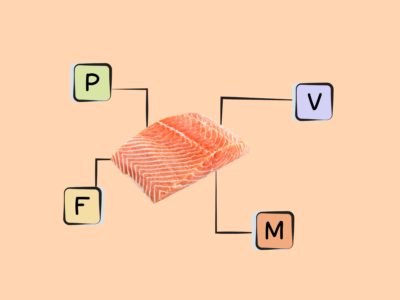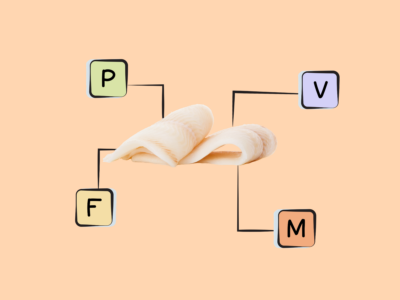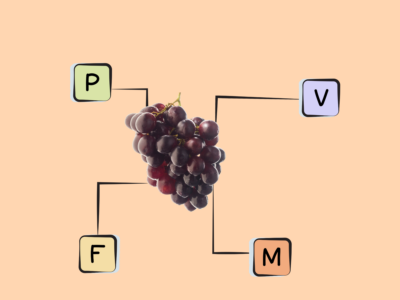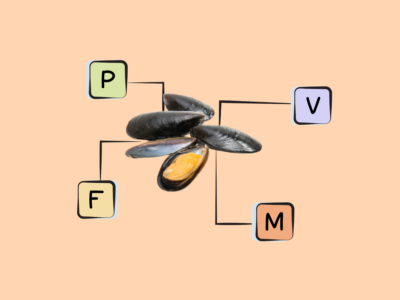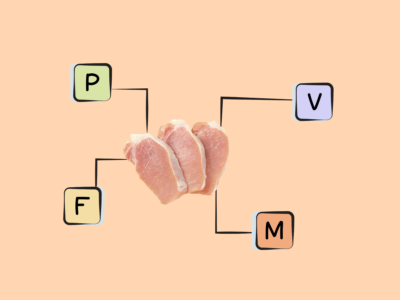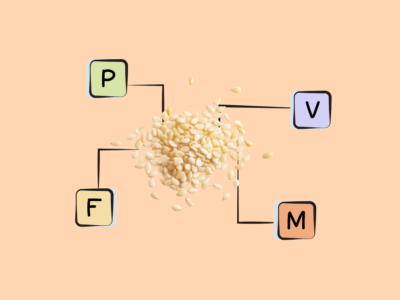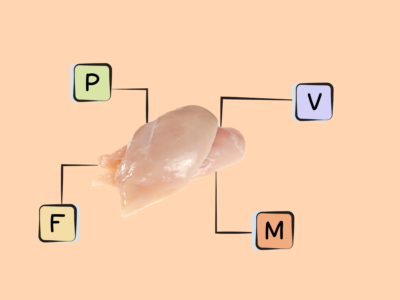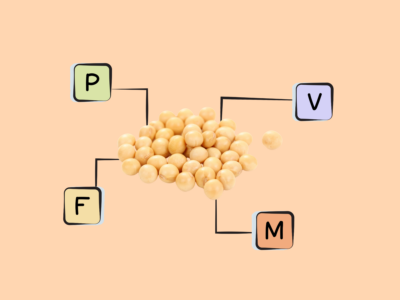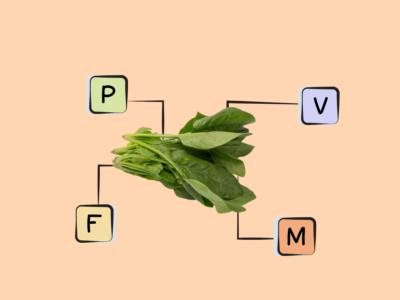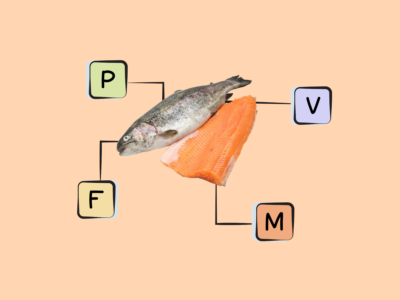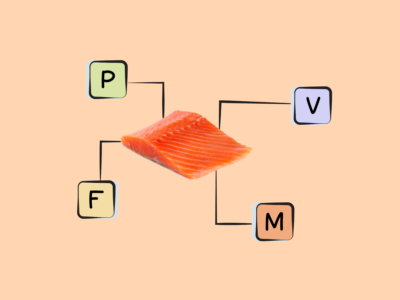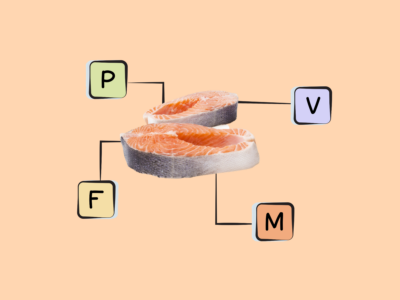Key Takeaways (expand)
- Coenzyme Q10, or CoQ10, is a fat-soluble, vitamin-like compound that’s found in all animals and most bacteria.
- CoQ10 cycles through three different chemical forms: ubiquinone, ubisemiquinone, and ubiquinol (where it’s the most highly bioavailable!).
- Although CoQ10 is synthesized by the human body, its synthesis peaks in our 20s and then declines with age.
- CoQ10 serves as a cofactor in the electron transport chain, helping cells produce energy.
- CoQ10 has powerful antioxidant functions—stabilizing cell membranes, helping recycle other antioxidant molecules, and enhancing the activity of the important antioxidant enzymes superoxide dismutase and glutathione peroxidase.
- CoQ10 can benefit heart failure patients, including reducing the risk of hospitalization and mortality.
- CoQ10 can help improve cardiovascular risk factors like high cholesterol, triglycerides, and blood pressure; however, evidence is unclear when it comes to affecting cardiovascular outcomes.
- Evidence suggests CoQ10 can help reduce pain, fatigue, tender points, and mental well-being in fibromyalgia patients.
- When taken after the 20th week of pregnancy, CoQ10 may reduce the risk of developing preeclampsia.
- CoQ10 has a positive effect on both female and male fertility—improving pregnancy odds among certain populations, protecting the ovarian reserve against some effects of aging, and improving sperm motility and possibly concentration.
- CoQ10 may improve insulin resistance and help normalize sex hormone levels among patients with polycystic ovarian syndrome.
- For people with non-alcoholic fatty liver disease, CoQ10 may help reduce liver enzymes and markers of inflammation.
- CoQ10 has shown promise for helping protect against asthma, although more research is needed.
- Multiple sclerosis patients may benefit from CoQ10, including seeing a reduction in fatigue, depression, inflammation, and clinical symptoms of disability.
- CoQ10 may also have a therapeutic role in rheumatoid arthritis, reducing measures of oxidative stress and joint inflammation.
- Limited but intriguing research suggests that oral CoQ10 could help improve the appearance of wrinkles, micro-relief lines, skin smoothness, and other visible signs of aging.
- CoQ10 has been shown to potentially improve psoriasis symptoms, especially in conjunction with other therapies and antioxidant nutrients.
- Preliminary research suggests CoQ10 could benefit patients with antiphospholipid syndrome.
- For both children and adult sufferers of migraines, CoQ10 has been shown to reduce the frequency, severity, and/or duration of migraine episodes.
- Studies suggests a potentially protective role of CoQ10 on skin caner, breast cancer, lung cancer, and pancreatic cancer, although more research is needed!
- Some evidence suggests CoQ10 can benefit type 2 diabetics—including reducing insulin resistance, inflammation, and oxidative stress.
- For patients with Parkinson’s disease, CoQ10 may help slow functional decline and reduce disease severity, though more research is needed.
- CoQ10 has an anti-inflammatory effect in gum tissue that gives it potential benefits in gum (periodontal) disease!
- CoQ10 deficiency can have numerous implications for health, affecting everything from muscle function to cardiovascular health to vision and hearing.
- The best food sources of CoQ10 are oily fish (including salmon, mackerel, yellowtail, trout, and sardines) and organ meats (especially heart, liver, and kidney); it’s also found in other meats, Brassica vegetables, legumes, nuts, and seeds.
Table of Contents[Hide][Show]
- What Are The Biological Roles of CoQ10?
How Does CoQ10 Affect Health and Disease?+−
- CoQ10 and Heart Failure
- CoQ10 and Dyslipidemia
- CoQ10 and Hypertension
- CoQ10 and Fibromyalgia
- CoQ10 and Preeclampsia
- CoQ10 and Fertility
- CoQ10 and Polycystic Ovarian Syndrome
- CoQ10 and Non-Alcoholic Fatty Liver Disease
- CoQ10 and Asthma
- CoQ10 and Multiple Sclerosis
- CoQ10 and Rheumatoid Arthritis
- CoQ10 and Visible Signs of Aging
- CoQ10 and Psoriasis
- CoQ10 and Antiphospholipid Syndrome
- CoQ10 and Migraine
- CoQ10 and Skin Cancer
- CoQ10 and Breast Cancer
- CoQ10 and Chronic Fatigue Syndrome
- CoQ10 and Lung Cancer
- CoQ10 and Pancreatic Cancer
- CoQ10 and Type 2 Diabetes
- CoQ10 and Parkinson’s Disease
- CoQ10 and Gum Disease
- CoQ10 and Lichen Planus
- CoQ10 and Ulcerative Colitis
- CoQ10 and Inflammation
- What Are the Symptoms CoQ10 Deficiency?
- Why is it Bad to Have Too Much CoQ10?
- How Much CoQ10 Do We Need?
- What Are the Best Food Sources of CoQ10?
- What Are Good Food Sources of CoQ10?
Coenzyme Q10, or CoQ10 (and also known as ubiquinone) is a fat-soluble, vitamin-like compound that’s found in all animals and most bacteria. In fact, the word “ubiquinone” refers to its ubiquitous presence in cells! This nutrient was first discovered in 1957, when a professor isolated it from beef heart mitochondria. Research on CoQ10 eventually led to a Nobel Prize in biochemistry, as well as decades of fascinating findings on its health benefits.
Along with acting as a potent antioxidant, CoQ10 serves as a cofactor in the electron transport chain, helping cells produce energy. It also has numerous epigenetic effects within genes involved in metabolism, disease mutation, cell signaling, phosphorylation, embryo development, and more! This nutrient may be helpful in treating or preventing heart and blood vessel conditions, diabetes, neurological diseases, gum disease, infertility, migraine, and some cancers.
The best sources of CoQ10 are oily fish (including salmon, mackerel, yellowtail, trout, and sardines), organ meats (especially heart, liver, and kidney), beef, chicken, and pork. It’s also found in smaller amounts in Brassica vegetables like broccoli, legumes, peanuts, nuts (especially pistachios, walnuts, and hazelnuts), and seeds.
Want to know the top 25 foods for this awesome nutrient?

The Top 25 Foods for Every Nutrient
The Top 25 Foods for Every Nutrient e-book is a well-organized, easy-to-use, grocery store-friendly guide to help you choose foods that fit your needs of 43 important nutrients while creating a balanced nutrient-dense diet.
Get two “Top 25” food lists for each nutrient, plus you’ll find RDA charts for everyone, informative visuals, fun facts, serving sizes and the 58 foods that are Nutrient Super Stars!
Buy now for instant digital access.
What Are The Biological Roles of CoQ10?
One of CoQ10’s most important roles is in participating in cellular respiration to generate adenosine triphosphate (ATP)—also known as the “energy currency” of cells! Specifically, CoQ10 acts as an electron carrier in the respiratory chain of mitochondria, where it accepts electrons from various donors. As a result, the highest concentrations of CoQ10 in the body are in organs with the highest energy requirements—particularly the heart, liver, pancreas, and kidney.
CoQ10 is also an important part of the body’s endogenous antioxidant system. It helps stabilize cell membranes by protecting phospholipids from oxidizing, and also helps recycle other antioxidant molecules (including alpha-tocopherol and ascorbate). On top of that, CoQ10 has been shown to enhance the activity of the important antioxidant enzymes superoxide dismutase and glutathione peroxidase.
CoQ10 cycles through three different chemical forms: ubiquinone, where it’s fully oxidized; ubisemiquinone, where it’s lost one hydrogen atom (making it a semi-oxidized free radical); and ubiquinol, its fully reduced form (where it’s also the most highly bioavailable!).
Along with being absorbed from food, CoQ10 is synthesized by the body. However, in humans, its synthesis peaks in our 20s and then declines with age.
Ditch Diets. Embrace Nutrients. Start with this FREE Guide.
Sign up for the free Nutrivore Newsletter, your weekly, science-backed guide to improving health through nutrient-rich foods — without dieting harder —and get the Beginner’s Guide to Nutrivore delivered straight to your inbox!

How Does CoQ10 Affect Health and Disease?
Given its powerful ability to combat oxidative stress and help generate energy for cells, CoQ10 has a wide range of protective effects for human health. In fact, it’s been shown to benefit everything from heart health, to mitochondrial diseases, to fertility, to autoimmune disease, and more!
CoQ10 and Heart Failure
One of CoQ10’s most-studied roles is in heart conditions—particularly the prevention and management of heart failure. A Cochrane review from 2021 found that among heart failure patients, CoQ10 supplementation reduced the risk of all-cause mortality by 42%, compared to unsupplemented patients; it also reduced the risk of hospitalization for heart failure by 38%. A 2017 meta-analysis of clinical studies likewise found a significant reduction in mortality among CoQ10-supplemented patients (31% lower risk), as well as a significant improvement in exercise capacity. And, low levels of CoQ10 have been associated with greater disease severity in heart failure patients.
These effects appear to be due to CoQ10’s ability to protect cardiac cells against oxidative damage, restore optimal levels of energy production in the heart, and assist in conducting signals within the heart muscle.
CoQ10 and Dyslipidemia
CoQ10 may help normalize high-risk blood lipid profiles, making them less atherogenic. For example, a 2022 meta-analysis of 50 randomized controlled trials found that CoQ10 supplementation significantly reduced total cholesterol, LDL cholesterol, and triglycerides, while also improving HDL levels. The greatest benefits were seen at dosages of 400 to 500 mg daily. A separate meta-analysis from 2018 likewise found that among people with existing metabolic diseases, CoQ10 supplementation significantly reduced triglyceride levels.
That being said, research on CoQ10 for actual cardiovascular disease outcomes has been less consistent. This is one area where more studies will be helpful!
CoQ10 and Hypertension
CoQ10 has demonstrated pronounced blood pressure-lowering effects in studies! A 2022 meta-analysis of randomized controlled trials found that CoQ10 supplementation of 100 to 200 mg daily can significantly lower systolic blood pressure—particularly among people with existing diabetes or elevated blood lipids. Likewise, for people currently taking medication to lower their blood pressure, supplementation with CoQ10 has been shown to help reduce the dose of medication needed. More research is needed to understand the exact mechanisms for these anti-hypertensive effects!
CoQ10 and Fibromyalgia
Multiple studies have found therapeutic value for CoQ10 in fibromyalgia. In a 2013 randomized controlled trial of 20 fibromyalgia patients, supplementation with 300 mg daily of CoQ10, for a period of 40 days, led to significant clinical improvements in pain, fatigue, morning tiredness, tender points, and Fibromyalgia Impact Questionnaire scores (a measure of overall disease impact). Another small trial from 2012 found that supplementation with 300 mg of CoQ10 for three months restored patients’ initially low CoQ10 levels, with a concurrent improvement in disease symptoms. And a preliminary study from 2017 found that a water-soluble form of CoQ10, given at doses of 200 mg twice per day to female fibromyalgia patients, led to significant improvements in most pain-related outcomes, along with a 33% improvement in sleep disturbance and a 22% improvement in fatigue!
A randomized controlled trial from 2019 further explored the mechanisms at play, and found that among fibromyalgia patients treated with pregabalin (a medication often prescribed for fibromyalgia pain management), the addition of CoQ10 led to greater reductions in pain and anxiety—likely due to improving mitochondrial function, decreasing pain-related brain activity, and lowering inflammation.
CoQ10 and Preeclampsia
Several studies show that CoQ10 may help protect against preeclampsia—a high blood pressure condition that can develop during pregnancy, originating from improper development of the placenta. A 2009 randomized controlled trial found that compared to placebo, pregnant women supplementing with 200 mg of CoQ10 daily, starting from 20 weeks of gestation until delivery, had a 44% lower risk of developing preeclampsia. Likewise, a 2019 experiment found that in a rodent model of preeclampsia, CoQ10 supplementation led to a reduction in preeclampsia symptoms, as well as enhanced function of placental mitochondria.
Interestingly, some animal research suggests that the timing of CoQ10 supplementation during pregnancy could be critical! A 2021 experiment using rats found that in early gestation, CoQ10 actually increased the risk of preeclampsia due to interfering with placental formation. Mild oxidative stress is needed for stimulating the proliferation and migration of specialized placenta cells (called trophoblasts), and the reduction in oxidative stress from CoQ10 can potentially compromise placenta development—in turn increasing the risk of placenta-related diseases like preeclampsia. More research is needed in humans to clarify how the timing of CoQ10 supplementation during pregnancy affects preeclampsia risk.
CoQ10 and Fertility
CoQ10 has shown intriguing benefits for both female and male fertility. For example, a 2020 systematic review and meta-analysis found that among women undergoing assisted reproductive technology procedures (such as in vitro fertilization), CoQ10 supplementation improved the chance of becoming pregnant by a whopping 244%! This held true for both women with poor ovarian reserve and with PCOS. Although the exact mechanisms are still being investigated, animal models suggest these fertility-enhancing effects may be due to CoQ10 improving the quality and quantity of oocytes (immature eggs), as well as inhibiting oocyte death by reducing DNA oxidation. Likewise, CoQ10 may help protect the ovarian reserve against some effects of aging.
Meanwhile, studies have shown that CoQ10 can have a positive effect on male fertility as well! A 2021 systematic review found that CoQ10 supplementation (especially at 200 mg daily) caused a near-universal increase in sperm motility, with many trials also showing a significant increase in sperm concentration. This is likely due to CoQ10 improving the antioxidant capacity of seminal fluid, in turn bolstering the body’s sperm protection systems and shielding sperm DNA from oxidative damage.
CoQ10 and Polycystic Ovarian Syndrome
CoQ10 offers potential benefits for patients with polycystic ovarian syndrome (PCOS)! In a 2023 systematic review and meta-analysis encompassing nine different trials, CoQ10 supplementation among PCOS patients was shown to significantly improve insulin resistance, reduce fasting insulin, help normalize sex hormone levels (including increasing FSH and lowering testosterone), and improve blood lipids (lowering triglycerides, LDL cholesterol, and total cholesterol, and HDL cholesterol). A 2022 randomized controlled trial additionally found that taking 100 mg of CoQ10 daily for 12 weeks led to improved mental health in PCOS patients (as measured by reductions in depression and anxiety scores), lowered inflammation, and reduced hirsutism (excessive hair growth in certain areas like the face). And in a 2021 controlled trial, obese PCOS patients saw significant decreases in endothelial dysfunction and inflammatory markers following supplementation with 200 mg of CoQ10 daily for eight weeks.
CoQ10 and Non-Alcoholic Fatty Liver Disease
Research shows that CoQ10 could be useful for patients with non-alcoholic fatty liver disease (NAFLD). A randomized controlled trial from 2016 found that supplementing NAFLD patients with 100 mg daily of CoQ10, for a period of 12 weeks, resulted in significant decreases in C-reactive protein (a marker of inflammation), liver aminotransferases (a signature of metabolic disturbances in the liver), tumor necrosis factor alpha (an inflammatory marker in NAFLD), and disease grade, relative to the placebo control group. A 2023 meta-analysis of clinical trials determined that CoQ10 supplementation was particularly effective for reducing liver enzymes when given at doses of at least 100 mg daily.
CoQ10 and Asthma
Some evidence suggests CoQ10 could have a protective effect against asthma. In animal models, supplementation with CoQ10 has been shown to control allergic asthma symptoms by up-regulating nuclear factor erythroid 2–related factor 2 (Nrf2)—a transcription factor with pivotal roles in inflammation. Human asthmatics have been shown to have reduced plasma levels of CoQ10, and respond to antioxidant supplementation (including CoQ10, alpha-tocopherol, and vitamin C) with a reduction in the corticosteroid dose needed to manage their symptoms. And, a small human trial from 2015 found that four weeks of daily CoQ10 supplementation (100 mg) had a beneficial effect on airflow and superoxide dismutase activity. More research, with larger sample sizes, is needed to explore these intriguing findings!
CoQ10 and Multiple Sclerosis
CoQ10 may offer unique benefits for multiple sclerosis (MS) patients. Abnormally low levels of CoQ10 have been identified in people with MS, and supplementation has been shown to improve measures of both physical and mental well-being. For example, a 2016 randomized, double-blind trial found that compared to placebo, 12 weeks of daily supplementation with 500 mg CoQ10 led to significant decreases in fatigue symptoms (as measured by the fatigue severity scale) and depression (as measured by the Beck depression inventory). Another analysis of that trial found that several inflammatory markers also declined, while oxidative stress decreased—an important finding, given that oxidative damage is a major driver of MS pathology (causing demyelination and axonal damage). And in a 2019 trial of 60 relapsing-remitting patients with MS, three months of supplementation with CoQ10 led to significant reductions in oxidative damage, inflammation, and clinical symptoms of disability, depression, pain, and fatigue. Studies with longer follow-ups will be helpful in illuminating the effects of CoQ10 on this disease in the long term!
Animal models of multiple sclerosis have confirmed that CoQ10 is capable of suppressing the inflammatory pathway of this disease.
CoQ10 and Rheumatoid Arthritis
Evidence suggests CoQ10 could benefit rheumatoid arthritis patients! In a randomized controlled trial from 2015, 100 mg daily of CoQ10, for a period of two months, led to significant reductions in malondialdehyde (a marker of oxidative stress), while also suppressing the over-expression of tumor necrosis factor alpha (TNF-α)—one of the main mediators of joint inflammation in rheumatoid arthritis. Likewise, a 2019 randomized controlled trial found that two months of CoQ10 supplementation (100 mg daily) reduced the elevation of matrix metalloproteinase-3 (an enzyme involved in cartilage destruction within joints), while also reducing patients’ pain scores, tender joint count, and erythrocyte sedimentation rate (a measure of inflammation). However, more studies are needed on this topic!
CoQ10 and Visible Signs of Aging
CoQ10 may offer important benefits for the skin—especially when it comes to aging! Although most of the research here has been conducted using topical applications of CoQ10, some studies also show that oral intake could also benefit the skin. In a 2017 randomized controlled trial, 12 weeks of supplementation with a water-soluble form of CoQ10 (150 mg daily) led to significant improvements in wrinkles, micro-relief lines, skin smoothness, and seasonal deterioration of viscoelasticity. More studies are needed to confirm and explore these findings.
CoQ10 and Psoriasis
Given its powerful anti-inflammatory effects, CoQ10 has been proposed as a potential adjunctive treatment for psoriasis. And while the research is limited, evidence so far is promising!
For example, in a 2022 clinical trial, adding 100 mg daily of CoQ10 to a biological therapy regimen resulted in significant improvements in quality of life and a psoriasis severity index scores. And, a trial from 2009 that gave psoriasis patients a combination of CoQ10 (50 mg daily) with vitamin E and selenium led to significant improvements in clinical conditions, as well as a faster normalization of oxidative stress markers. (Of course, given the multiple antioxidants involved, it’s hard to say how much of these effects were from CoQ10 specifically!)
CoQ10 and Antiphospholipid Syndrome
Antiphospholipid syndrome is an autoimmune disorder where the body mistakenly creates antibodies against normal proteins in the blood—in turn increasing the risk of blood clots and pregnancy issues (including miscarriage and stillbirth). Although there’s no known cure, research suggests that CoQ10 could play a therapeutic role in this condition!
Specifically, 2017 randomized controlled trial found that giving patients 200 mg daily of CoQ10 (in the form of ubiquinol) for one month significantly reduced the expression of inflammatory and pro-thrombotic risk markers, improved endothelial function, and improved cellular mitochondrial health—suggesting a substantial clinical benefit for this disorder. More studies are needed to confirm and further test these findings!
CoQ10 and Migraine
Some research suggests a beneficial role of CoQ10 on migraines, reducing their frequency and/or their duration. A 2019 meta-analysis of five different studies determined that CoQ10 supplementation was more effective than placebo at reducing the number of days each month spent suffering from migraine symptoms, as well as reducing the duration of individual migraine episodes. Another meta-analysis from 2021 found that among adult migraine patients, supplementation with CoQ10 appeared to reduce both migraine severity and the length of migraine attacks. A randomized controlled trial from 2022 found that among children aged 5 to 15, three months of supplementation with CoQ10 led to comparable therapeutic effects as amitriptyline, a drug commonly prescribed for controlling migraines; it also significantly increased quality of life for both the patients and their families. In general, doses shown to be effective in these studies have ranged from 100 to 400 mg daily.
CoQ10 and Skin Cancer
Although research is limited so far, some studies have suggested a link between CoQ10 and skin cancer. A 2006 analysis found that among patients with melanoma, plasma CoQ10 levels were a significant predictor of metastasis. Specifically, people with CoQ10 levels below the low end of the “normal” range were almost eight times more likely to have their cancer metastasize than people with higher CoQ10 levels. Likewise, patients with higher CoQ10 had longer durations of remaining metastasis-free. More research here is needed!
CoQ10 and Breast Cancer
Some research has explored a protective role of CoQ10 in breast cancer. Several studies have shown that tissue levels of CoQ10 tend to be low in breast cancer patients, possibly due to increased CoQ10 depletion by malignant cells (which generate reactive oxygen species and increase the body’s use of antioxidants). Likewise, low levels of CoQ10 among breast cancer patients have been associated with worse prognosis.
A 2021 systematic review and meta-analysis found that among breast cancer patients, CoQ10 supplementation reduced several important markers of inflammation and matrix metalloproteinases (a group of enzymes involved in tumor progression, and which have been linked to poor breast cancer prognosis). A 2010 in vitro study likewise confirmed that in a breast cancer cell line, exposure to CoQ10 reduced levels of MMP-2—a specific matrix metalloproteinase that serves as a marker for tumor growth, progression, metastasis, and angiogenesis (the formation of new blood vessels that allows tumors to grow and metastasize). And, a 2008 study found that combining 100 mg of CoQ10 with the anti-cancer drug tamoxifen reduced angiogenesis.
Although the findings so far are promising, more research is needed to test the effects of CoQ10 on actual clinical outcomes for breast cancer!
CoQ10 and Chronic Fatigue Syndrome
A 2021 randomized, double-blind, placebo-controlled trial found that among patients with myalgic encephalomyelitis/chronic fatigue syndrome (ME/CFS), 12 weeks of supplementing with 200 mg CoQ10 each day (combined with 20 mg daily of NADH, the reduced form of nicotinamide adenine dinucleotide) led to significant improvements in cognitive fatigue perception, fatigue impact scale scores, health-related quality of life, and sleep duration. A 2009 analysis also found that chronic fatigue patients had significantly lower levels of plasma CoQ10 relative to healthy controls: up to 44.8% of patients had CoQ10 values beneath the lowest plasma CoQ10 value measured among in the controls. In addition, there were significant inverse relationships between CoQ10 and FibroFatigue (FF) scale scores, fatigue, and autonomic symptoms. Chronic fatigue patients with very low CoQ10 levels also had significantly more concentration and memory disturbances!
Everything You Need to Jump into Nutrivore TODAY!
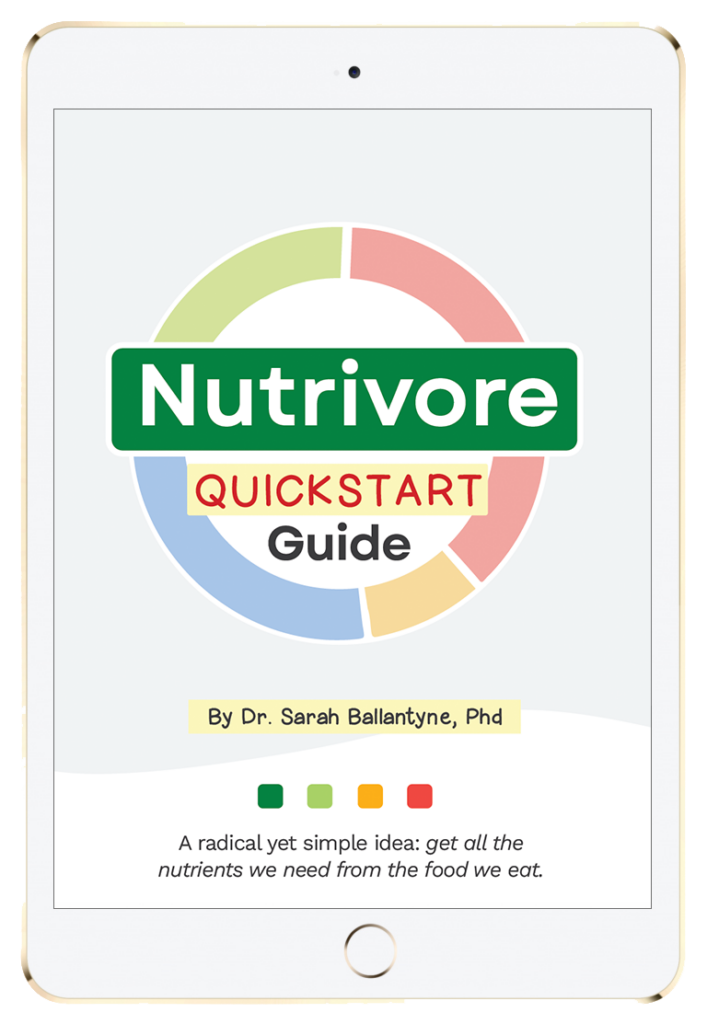
Nutrivore Quickstart Guide
The Nutrivore Quickstart Guide e-book explains why and how to eat a Nutrivore diet, introduces the Nutrivore Score, gives a comprehensive tour of the full range of essential and important nutrients!
Plus, you’ll find the Top 100 Nutrivore Score Foods, analysis of food groups, practical tips to increase the nutrient density of your diet, and look-up tables for the Nutrivore Score of over 700 foods.
Buy now for instant digital access.
CoQ10 and Lung Cancer
A 2021 prospective cohort study found that even after adjusting for confounders like age, sex, race, socioeconomic status, alcohol intake, and BMI, blood CoQ10 levels were significantly inversely associated with lung cancer risk—particularly among current smokers. Specifically, people in the highest versus lowest tertile of CoQ10 concentrations had a 40% lower risk of developing lung cancer! Likewise, a 2011 analysis found that patients with lung cancer had significantly lower levels of CoQ10 in their blood compared to healthy individuals. Controlled trials are needed to test whether CoQ10 intake could improve clinical outcomes for lung cancer patients.
CoQ10 and Pancreatic Cancer
In a 2021 experiment, CoQ10 (in the oxidized form ubidecarenone) exerted anti-cancer effects on pancreatic cancer cells, through targeting mitochondrial functioning. Likewise, some research has shown low CoQ10 levels among pancreatic cancer patients. However, much more research is needed here (especially controlled human trials) to see whether CoQ10 affects disease progression and survival of this cancer.
CoQ10 and Type 2 Diabetes
Studies suggest a protective effect of CoQ10 on type 2 diabetes! In a 2022 meta-analysis of randomized controlled trials, encompassing 40 different studies, CoQ10 supplementation (particularly in the range of 100 to 200 mg per day) was shown to significantly reduce fasting insulin, fasting glucose, HOMA-IR, and HbA1c (a measure of long-term blood sugar control). Additional research shows that type 2 diabetics tend to have significantly lower levels of CoQ10 than healthy controls—possibly thwarting the body’s ability to counteract oxidative stress caused by high blood sugar.
Interestingly, CoQ10 may assist with glycemic control by enhancing the functioning of glycerol-3-phosphate dehydrogenase, a mitochondrial enzyme involved in pancreatic beta cell signaling. In general, many of this nutrient’s anti-diabetic effects appear due to its effects on oxidative damage and inflammation, which in turn protect against oxidative stress-induced abnormalities in various mitochondrial functions.
CoQ10 and Parkinson’s Disease
CoQ10 appears to play a role in neurodegenerative diseases, especially Parkinson’s disease—although scientists are still trying to clarify the link. A 2022 systematic review found that compared to healthy controls, patients with Parkinson’s disease have lower levels of CoQ10 throughout their bodies (including in the cerebellar cortex, platelets, and lymphocytes), as well as higher levels of oxidized CoQ10 in their cerebrospinal fluid. A 2002 multi-center trial found that supplementation with CoQ10 slowed the progression of functional decline in Parkinson’s patients, especially at higher doses (1200 mg daily).
And, a 2015 placebo-controlled pilot trial found that giving Parkinson’s patients 300 mg of CoQ10 daily (in the reduced form ubiquinol) for 48 or 96 weeks led to significant improvements in the Unified Parkinson’s Disease Rating Scale—a measure of disease severity tracking cognitive and mood status, daily living experiences, and motor complications.
However, some trials haven’t found any effect of CoQ10 supplementation on Parkinson’s symptoms, leading to theories that specific sub-groups of Parkinson’s patients may be most responsive to this nutrient. For example, a 2014 clinical trial found that the patients benefitting from CoQ10 supplementation (between 400 and 2400 mg daily for two weeks) were those with the lowest baseline CoQ10 levels—suggesting that initial CoQ10 status is an important factor here. Other trials are currently testing how Parkinson’s patients with certain variants of mitochondrial genes (leading to greater mitochondrial dysfunction) respond to CoQ10 supplementation.
So, while it appears CoQ10 may be helpful for some Parkinson’s disease patients, more research is needed!
CoQ10 and Gum Disease
That’s right; CoQ10 could even benefit dental health! Specifically, higher concentrations of CoQ10 in the gingiva suppress periodontal inflammation (a hallmark of gum disease) by combatting the reactive oxygen species generated by harmful bacteria in the mouth. Likewise, multiple studies have shown that patients with periodontal disease have lower levels of CoQ10 in their gingiva compared to healthy controls; restoring CoQ10 to normal concentrations is therefore an important part of healing. A 2022 meta-analysis of clinical trials found that topically applied CoQ10 has a significant reducing effect on patients’ plaque index, gum pocket depth, bleeding index, and clinical attachment loss (the loss of supporting tissue around the tooth). Likewise, a 2022 trial of diabetic patients found that oral CoQ10 supplementation helps accelerate the periodontal treatment process (including scaling and root planing).
CoQ10 and Lichen Planus
Some research has shown a therapeutic effect of CoQ10 on lichen planus, an autoimmune disease in which the body mistakenly attacks cells of the skin or mucous membranes. And while most of the research done here has been on topical applications of CoQ10, even oral forms could benefit this condition! For example, a 2016 trial found that combining dietary CoQ10 with topical corticosteroids led to greater symptom improvements than corticosteroids alone—particularly for reducing pain and decreasing the size of lesions.
CoQ10 and Ulcerative Colitis
CoQ10 could potentially help patients with ulcerative colitis manage their symptoms. A 2021 randomized clinical trial of ulcerative colitis patients found that after eight weeks of taking 200 mg of CoQ10 daily, scores for Simple Clinical Colitis Activity Index (SCCAI) and inflammatory bowel disease questionnaire-32 (IBDQ-32) improved significantly, indicating a reduction in disease severity and improvement in quality of life. Both diastolic and systolic blood pressure also decreased among the CoQ10 group relative to placebo.
Animal models of colitis have helped reveal the mechanisms underlying these effects, showing that CoQ10 exerts antioxidant and anti-inflammatory activities by enhancing catalase activity and glutathione content, increasing the expression of p-AMPK and FOXP3, decreasing myeloperoxidase (MPO) activity, decreasing malondialdehyde (MDA) content, inhibiting p-STAT3 and IL-17, and reducing nitrate/nitrite production.
CoQ10 and Inflammation
Along with helping improve a number of inflammation-related conditions, CoQ10 has shown general anti-inflammatory effects across studies. A 2017 systematic review and meta-analysis of 17 randomized controlled trials found that CoQ10 has significant lowering effects on the inflammatory mediators C-reactive protein, interleukin-6, and tumor necrosis factor-alpha. A more recent 2023 GRADE-assessed review and meta-analysis confirmed these findings, also showing that the optimal intake for achieving these anti-inflammatory effects appears to be 300 to 400 mg of CoQ10 daily.
Didn’t know CoQ10 was this dazzling? Maybe your friends will enjoy this too!
What Are the Symptoms CoQ10 Deficiency?
CoQ10 deficiency can occur in one of two ways: either though a reduction in how much the body is creating, or through an increase in how much the body is using. CoQ10 biosynthesis decreases with age, during certain health conditions (such as heart disease), during vitamin B6 deficiency (due to vitamin B6 being required for the conversion of CoQ10 from tyrosine), from certain genetic conditions (like phenylketonuria), and from the use of statin drugs (which block the production of certain molecules within the CoQ10 biosynthesis pathway). As a result, CoQ10 deficiency becomes more likely under these particular circumstances!
When it occurs, CoQ10 deficiency can contribute to a wide range of health problems—particularly those originating in body parts with high energy requirements. This can include ataxia (impaired muscle control leading to poor coordination, slurred speech, and various voluntary movements), seizures, kidney dysfunction, abnormal eye movements, muscle pain and weakness, hearing damage, vision loss, and cardiac problems (including heart failure and hypertrophic cardiomyopathy).
Easily track your servings of Nutrivore Foundational Foods!
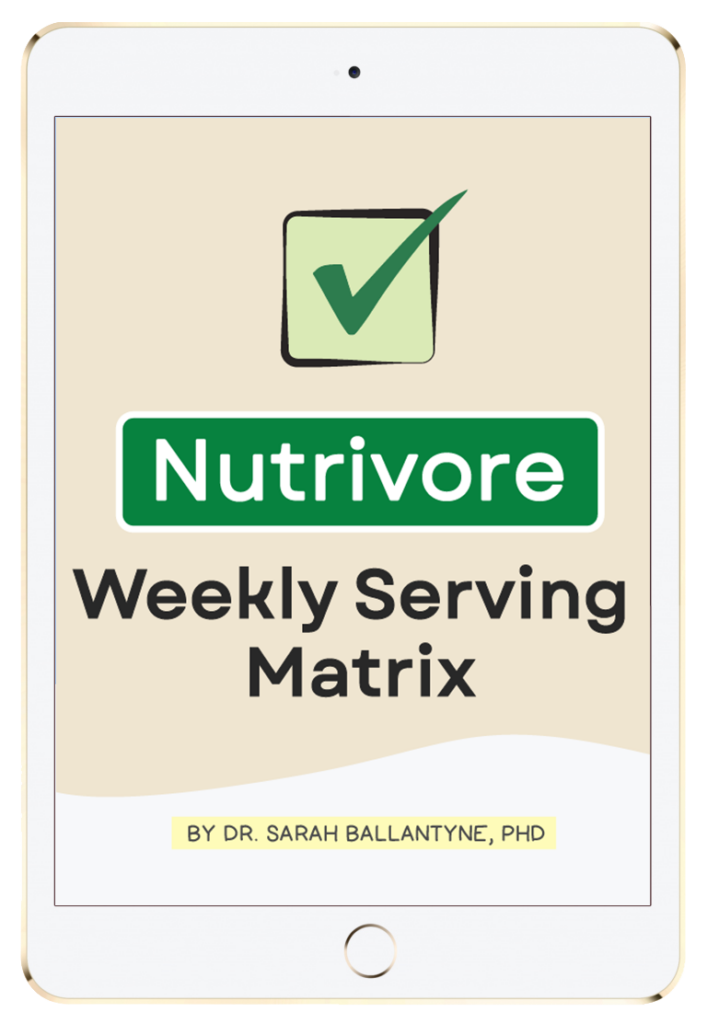
The Nutrivore Weekly Serving Matrix
The Nutrivore Weekly Serving Matrix digital resource is an easy-to-use and flexible weekly checklist designed to help you maximize nutrient-density and meet serving suggestions of Nutrivore foundational foods, all without having to weigh or measure your foods!
Includes a 22-page instructional guide and downloadable interactive guides.
Buy now for instant digital access.
Why is it Bad to Have Too Much CoQ10?
Although it’s nearly impossible to consume too much CoQ10 from foods alone, in some cases, very high intakes from dietary supplements can cause adverse effects. Most commonly, these include gastrointestinal symptoms like diarrhea, nausea, and heartburn; however, in some people, mild insomnia, dizziness, irritability, headache, and elevated liver enzymes have been seen. Intakes of up to 1200 mg daily are generally deemed safe and unlikely to produce unwanted side effects.
Even at normally safe intakes, CoQ10 may interfere with the effectiveness of blood thinners (such as warfarin). Consult your healthcare provider if you’re currently taking such medications and are considering supplementing with CoQ10.
How Much CoQ10 Do We Need?
There’s currently no recommended dietary allowance set for CoQ10, and because its synthesis by the body is affected by a number of factors (including age and health status), blanket recommendations for optimal intake are hard to establish. However, intakes of 30 to 200 mg per day (from food or supplements) may be useful for older individuals, as well as for people combatting health conditions like failure or taking CoQ10 depleting medications such as cholesterol-lowering drugs.
Nutrient Daily Values
Nutrition requirements and recommended nutrient intake for infants, children, adolescents, adults, mature adults, and pregnant and lactating individuals.
What Are the Best Food Sources of CoQ10?
The following foods have high concentrations of CoQ10, containing at least 3 milligrams per serving, making them our best food sources of this valuable nutrient!
Want to know the top 500 most nutrient-dense foods?
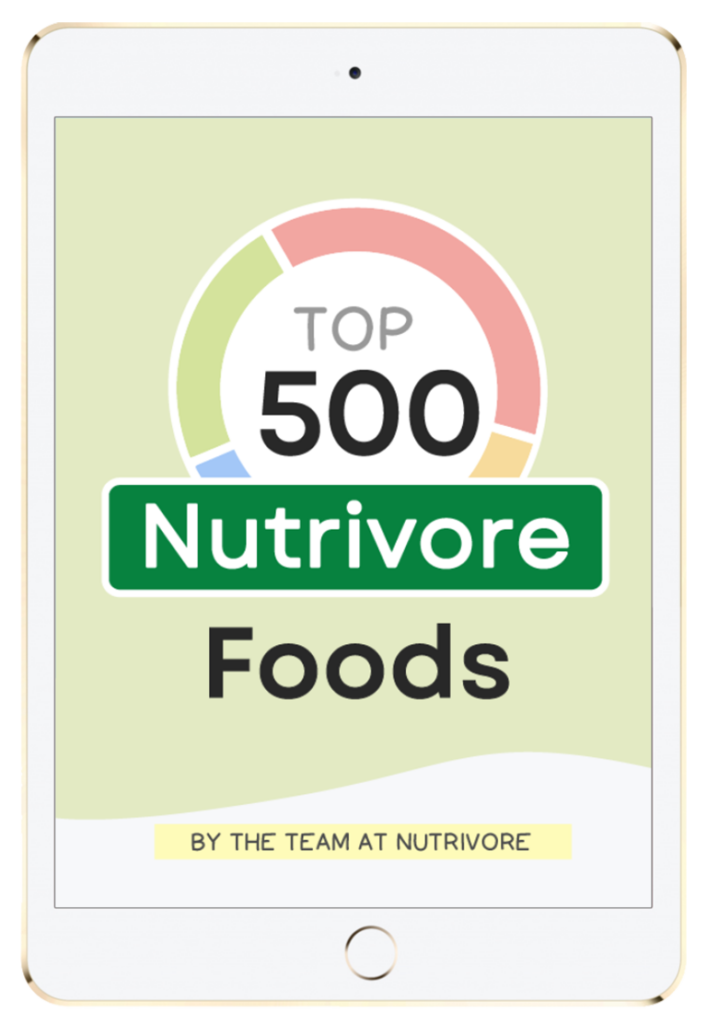
Top 500 Nutrivore Foods
The Top 500 Nutrivore Foods e-book is an amazing reference deck of the top 500 most nutrient-dense foods according to their Nutrivore Score. Think of it as the go-to resource for a super-nerd, to learn more and better understand which foods stand out, and why!
If you are looking for a quick-reference guide to help enhance your diet with nutrients, and dive into the details of your favorite foods, this book is your one-stop-shop!
Buy now for instant digital access.
What Are Good Food Sources of CoQ10?
The following foods are also excellent or good sources of CoQ10, containing at least 0.6 milligrams (and up to 3 milligrams) per serving.
Ditch Diets. Embrace Nutrients. Start with this FREE Guide.
Sign up for the free Nutrivore Newsletter, your weekly, science-backed guide to improving health through nutrient-rich foods — without dieting harder —and get the Beginner’s Guide to Nutrivore delivered straight to your inbox!

Citations
Expand to see all scientific references for this article.
Abdollahzad H, Aghdashi MA, Asghari Jafarabadi M, Alipour B. Effects of Coenzyme Q10 Supplementation on Inflammatory Cytokines (TNF-α, IL-6) and Oxidative Stress in Rheumatoid Arthritis Patients: A Randomized Controlled Trial. Arch Med Res. 2015 Oct;46(7):527-33. doi: 10.1016/j.arcmed.2015.08.006.
Al Saadi T, Assaf Y, Farwati M, Turkmani K, Al-Mouakeh A, Shebli B, Khoja M, Essali A, Madmani ME. Coenzyme Q10 for heart failure. Cochrane Database Syst Rev. 2021 Feb 3;(2)(2):CD008684. doi: 10.1002/14651858.CD008684.pub3.
Al-Oudah GA, Sahib AS, Al-Hattab MK, Al-Ameedee AA. Effect of CoQ10 Administration to Psoriatic Iraqi Patients on Biological Therapy Upon Severity Index (PASI) and Quality of Life Index (DLQI) Before and After Therapy. J Popul Ther Clin Pharmacol. 2022 Jun 16;29(2):e52-e60. doi: 10.47750/jptcp.2022.931.
Alimohammadi M, Rahimi A, Faramarzi F, Golpour M, Jafari-Shakib R, Alizadeh-Navaei R, Rafiei A. Effects of coenzyme Q10 supplementation on inflammation, angiogenesis, and oxidative stress in breast cancer patients: a systematic review and meta-analysis of randomized controlled- trials. Inflammopharmacology. 2021 Jun;29(3):579-593. doi: 10.1007/s10787-021-00817-8.
Ardekani A, Tabrizi R, Maleki E, Bagheri Lankarani K, Heydari ST, Moradinazar M, Akbari M. Effects of coenzyme Q10 supplementation on lipid profiles and liver enzymes of nonalcoholic fatty liver disease (NAFLD) patients: A systematic review and meta-analysis of randomized controlled trials. Food Sci Nutr. 2023 Mar 13;11(6):2580-2588. doi: 10.1002/fsn3.3315.
Bahar M, Khaghani S, Pasalar P, Paknejad M, Khorramizadeh MR, Mirmiranpour H, Nejad SG. Exogenous coenzyme Q10 modulates MMP-2 activity in MCF-7 cell line as a breast cancer cellular model. Nutr J. 2010 Nov 30;9:62. doi: 10.1186/1475-2891-9-62.
Barcelos IP, Haas RH. CoQ10 and Aging. Biology (Basel). 2019 May 11;8(2):28. doi: 10.3390/biology8020028.
Ben-Meir A, Burstein E, Borrego-Alvarez A, Chong J, Wong E, Yavorska T, Naranian T, Chi M, Wang Y, Bentov Y, Alexis J, Meriano J, Sung HK, Gasser DL, Moley KH, Hekimi S, Casper RF, Jurisicova A. Coenzyme Q10 restores oocyte mitochondrial function and fertility during reproductive aging. Aging Cell. 2015 Oct;14(5):887-95. doi: 10.1111/acel.12368.
Blatt T, Littarru GP. Biochemical rationale and experimental data on the antiaging properties of CoQ(10) at skin level. Biofactors. 2011 Sep-Oct;37(5):381-5. doi: 10.1002/biof.169.
Castro-Marrero J, Segundo MJ, Lacasa M, Martinez-Martinez A, Sentañes RS, Alegre-Martin J. Effect of Dietary Coenzyme Q10 Plus NADH Supplementation on Fatigue Perception and Health-Related Quality of Life in Individuals with Myalgic Encephalomyelitis/Chronic Fatigue Syndrome: A Prospective, Randomized, Double-Blind, Placebo-Controlled Trial. Nutrients. 2021 Jul 30;13(8):2658. doi: 10.3390/nu13082658.
Claxton L, Simmonds M, Beresford L, Cubbon R, Dayer M, Gottlieb SS, Hartshorne-Evans N, Kilroy B, Llewellyn A, Rothery C, Sharif S, Tierney JF, Witte KK, Wright K, Stewart LA. Coenzyme Q10 to manage chronic heart failure with a reduced ejection fraction: a systematic review and economic evaluation. Health Technol Assess. 2022 Jan;26(4):1-128. doi: 10.3310/KVOU6959.
Cobanoglu U, Demir H, Cebi A, Sayir F, Alp HH, Akan Z, Gur T, Bakan E. Lipid peroxidation, DNA damage and coenzyme Q10 in lung cancer patients–markers for risk assessment? Asian Pac J Cancer Prev. 2011;12(6):1399-403.
Comhair SA, Grandon D, Khan A, Zhang R, Hazen SL, Erzurum SC. Coenzyme Q in asthma. Am J Respir Crit Care Med. 2015 Jun 1;191(11):1336-8. doi: 10.1164/rccm.201412-2259LE.
Cordero MD, Alcocer-Gómez E, de Miguel M, Culic O, Carrión AM, Alvarez-Suarez JM, Bullón P, Battino M, Fernández-Rodríguez A, Sánchez-Alcazar JA. Can coenzyme q10 improve clinical and molecular parameters in fibromyalgia? Antioxid Redox Signal. 2013 Oct 20;19(12):1356-61. doi: 10.1089/ars.2013.5260.
Cordero MD, Santos-García R, Bermejo-Jover D, Sánchez-Domínguez B, Jaramillo-Santos MR, Bullón P. Coenzyme Q10 in salivary cells correlate with blood cells in Fibromyalgia: improvement in clinical and biochemical parameter after oral treatment. Clin Biochem. 2012 Apr;45(6):509-11. doi: 10.1016/j.clinbiochem.2012.02.001.
Dadali T, Diers AR, Kazerounian S, Muthuswamy SK, Awate P, Ng R, Mogre S, Spencer C, Krumova K, Rockwell HE, McDaniel J, Chen EY, Gao F, Diedrich KT, Vemulapalli V, Rodrigues LO, Akmaev VR, Thapa K, Hidalgo M, Bose A, Vishnudas VK, Moser AJ, Granger E, Kiebish MA, Gesta S, Narain NR, Sarangarajan R. Elevated levels of mitochondrial CoQ10 induce ROS-mediated apoptosis in pancreatic cancer. Sci Rep. 2021 Mar 11;11(1):5749. doi: 10.1038/s41598-021-84852-z.
Di Lorenzo A, Iannuzzo G, Parlato A, Cuomo G, Testa C, Coppola M, D’Ambrosio G, Oliviero DA, Sarullo S, Vitale G, Nugara C, Sarullo FM, Giallauria F. Clinical Evidence for Q10 Coenzyme Supplementation in Heart Failure: From Energetics to Functional Improvement. J Clin Med. 2020 Apr 27;9(5):1266. doi: 10.3390/jcm9051266.
Di Pierro F, Rossi A, Consensi A, Giacomelli C, Bazzichi L. Role for a water-soluble form of CoQ10 in female subjects affected by fibromyalgia. A preliminary study. Clin Exp Rheumatol. 2017 May-Jun;35 Suppl 105(3):20-27.
Du Q, Meng W, Athari SS, Wang R. The effect of Co-Q10 on allergic rhinitis and allergic asthma. Allergy Asthma Clin Immunol. 2021 Mar 20;17(1):32. doi: 10.1186/s13223-021-00534-5.
El Morsy EM, Kamel R, Ahmed MA. Attenuating effects of coenzyme Q10 and amlodipine in ulcerative colitis model in rats. Immunopharmacol Immunotoxicol. 2015 Jun;37(3):244-51. doi: 10.3109/08923973.2015.1021357.
Eriksson EK, Agmo Hernández V, Edwards K. Effect of ubiquinone-10 on the stability of biomimetic membranes of relevance for the inner mitochondrial membrane. Biochim Biophys Acta Biomembr. 2018 May;1860(5):1205-1215. doi: 10.1016/j.bbamem.2018.02.015.
Ewees MG, Messiha BA, Abo-Saif AA, Abd El-Latif HA. Is Coenzyme Q10 Effective in Protection against Ulcerative Colitis? An Experimental Study in Rats. Biol Pharm Bull. 2016;39(7):1159-66. doi: 10.1248/bpb.b16-00124.
Fan L, Feng Y, Chen GC, Qin LQ, Fu CL, Chen LH. Effects of coenzyme Q10 supplementation on inflammatory markers: A systematic review and meta-analysis of randomized controlled trials. Pharmacol Res. 2017 May;119:128-136. doi: 10.1016/j.phrs.2017.01.032.
Farsi F, Ebrahimi-Daryani N, Barati M, Janani L, Karimi MY, Akbari A, Irandoost P, Mesri Alamdari N, Agah S, Vafa M. Effects of coenzyme Q10 on health-related quality of life, clinical disease activity and blood pressure in patients with mild to moderate ulcerative colitis: a randomized clinical trial. Med J Islam Repub Iran. 2021 Jan 6;35:3. doi: 10.47176/mjiri.35.3.
Farsi F, Mohammadshahi M, Alavinejad P, Rezazadeh A, Zarei M, Engali KA. Functions of Coenzyme Q10 Supplementation on Liver Enzymes, Markers of Systemic Inflammation, and Adipokines in Patients Affected by Nonalcoholic Fatty Liver Disease: A Double-Blind, Placebo-Controlled, Randomized Clinical Trial. J Am Coll Nutr. 2016 May-Jun;35(4):346-53. doi: 10.1080/07315724.2015.1021057.
Florou P, Anagnostis P, Theocharis P, Chourdakis M, Goulis DG. Does coenzyme Q10 supplementation improve fertility outcomes in women undergoing assisted reproductive technology procedures? A systematic review and meta-analysis of randomized-controlled trials. J Assist Reprod Genet. 2020 Oct;37(10):2377-2387. doi: 10.1007/s10815-020-01906-3.
Gazdik F, Gvozdjakova A, Horvathova M, Weissova S, Kucharska J, Pijak MR, Gazdikova K. Levels of coenzyme Q10 in asthmatics. Bratisl Lek Listy. 2002;103(10):353-6.
Gvozdjáková A, Kucharská J, Bartkovjaková M, Gazdíková K, Gazdík FE. Coenzyme Q10 supplementation reduces corticosteroids dosage in patients with bronchial asthma. Biofactors. 2005;25(1-4):235-40. doi: 10.1002/biof.5520250129.
Hargreaves I, Heaton RA, Mantle D. Disorders of Human Coenzyme Q10 Metabolism: An Overview. Int J Mol Sci. 2020 Sep 13;21(18):6695. doi: 10.3390/ijms21186695.
Hou S, Tian Z, Zhao D, Liang Y, Dai S, Ji Q, Fan Z, Liu Z, Liu M, Yang Y. Efficacy and Optimal Dose of Coenzyme Q10 Supplementation on Inflammation-Related Biomarkers: A GRADE-Assessed Systematic Review and Updated Meta-Analysis of Randomized Controlled Trials. Mol Nutr Food Res. 2023 Jul;67(13):e2200800. doi: 10.1002/mnfr.202200800.
Jhun J, Lee SH, Byun JK, Jeong JH, Kim EK, Lee J, Jung YO, Shin D, Park SH, Cho ML. Coenzyme Q10 suppresses Th17 cells and osteoclast differentiation and ameliorates experimental autoimmune arthritis mice. Immunol Lett. 2015 Aug;166(2):92-102. doi: 10.1016/j.imlet.2015.05.012.
Jiménez-Jiménez FJ, Alonso-Navarro H, García-Martín E, Agúndez JAG. Coenzyme Q10 and Parkinsonian Syndromes: A Systematic Review. J Pers Med. 2022 Jun 15;12(6):975. doi: 10.3390/jpm12060975.
Jolliet P, Simon N, Barré J, Pons JY, Boukef M, Paniel BJ, Tillement JP. Plasma coenzyme Q10 concentrations in breast cancer: prognosis and therapeutic consequences. Int J Clin Pharmacol Ther. 1998 Sep;36(9):506-9.
Karamali M, Gholizadeh M. The effects of coenzyme Q10 supplementation on metabolic profiles and parameters of mental health in women with polycystic ovary syndrome. Gynecol Endocrinol. 2022 Jan;38(1):45-49. doi: 10.1080/09513590.2021.1991910.
Kharaeva Z, Gostova E, De Luca C, Raskovic D, Korkina L. Clinical and biochemical effects of coenzyme Q(10), vitamin E, and selenium supplementation to psoriasis patients. Nutrition. 2009 Mar;25(3):295-302. doi: 10.1016/j.nut.2008.08.015.
Knook DL, Planta RJ. Function of ubiquinone in electron transport from reduced nicotinamide adenine dinucleotide to nitrate and oxygen in Aerobacter aerogenes. J Bacteriol. 1971 Feb;105(2):483-8. doi: 10.1128/jb.105.2.483-488.1971.
Lee SY, Lee SH, Yang EJ, Kim JK, Kim EK, Jung K, Jung H, Lee K, Lee HH, Lee BI, Park SH, Shin DY, Cho ML. Coenzyme Q10 Inhibits Th17 and STAT3 Signaling Pathways to Ameliorate Colitis in Mice. J Med Food. 2017 Sep;20(9):821-829. doi: 10.1089/jmf.2016.3859.
Lei L, Liu Y. Efficacy of coenzyme Q10 in patients with cardiac failure: a meta-analysis of clinical trials. BMC Cardiovasc Disord. 2017 Jul 24;17(1):196. doi: 10.1186/s12872-017-0628-9.
Maes M, Mihaylova I, Kubera M, Uytterhoeven M, Vrydags N, Bosmans E. Coenzyme Q10 deficiency in myalgic encephalomyelitis/chronic fatigue syndrome (ME/CFS) is related to fatigue, autonomic and neurocognitive symptoms and is another risk factor explaining the early mortality in ME/CFS due to cardiovascular disorder. Neuro Endocrinol Lett. 2009;30(4):470-6.
Mantle D, Hargreaves IP. Coenzyme Q10 and Endocrine Disorders: An Overview. Antioxidants (Basel). 2023 Feb 17;12(2):514. doi: 10.3390/antiox12020514.
Merle CL, Lenzen C, Schmalz G, Ziebolz D. Systematic Review on Protocols of Coenzyme Q10 Supplementation in Non-Surgical Periodontitis Therapy. Nutrients. 2023 Mar 24;15(7):1585. doi: 10.3390/nu15071585.
Moccia M, Capacchione A, Lanzillo R, Carbone F, Micillo T, Perna F, De Rosa A, Carotenuto A, Albero R, Matarese G, Palladino R, Brescia Morra V. Coenzyme Q10 supplementation reduces peripheral oxidative stress and inflammation in interferon-β1a-treated multiple sclerosis. Ther Adv Neurol Disord. 2019 Feb 18;12:1756286418819074. doi: 10.1177/1756286418819074.
Montero R, Yubero D, Salgado MC, González MJ, Campistol J, O’Callaghan MDM, Pineda M, Delgadillo V, Maynou J, Fernandez G, Montoya J, Ruiz-Pesini E, Meavilla S, Neergheen V, García-Cazorla A, Navas P, Hargreaves I, Artuch R. Plasma coenzyme Q10 status is impaired in selected genetic conditions. Sci Rep. 2019 Jan 28;9(1):793. doi: 10.1038/s41598-018-37542-2.
Nachvak SM, Alipour B, Mahdavi AM, Aghdashi MA, Abdollahzad H, Pasdar Y, Samadi M, Mostafai R. Effects of coenzyme Q10 supplementation on matrix metalloproteinases and DAS-28 in patients with rheumatoid arthritis: a randomized, double-blind, placebo-controlled clinical trial. Clin Rheumatol. 2019 Dec;38(12):3367-3374. doi: 10.1007/s10067-019-04723-x.
Nakamura R, Littarru GP, Folkers K, Wilkinson EG. Study of CoQ10-enzymes in gingiva from patients with periodontal disease and evidence for a deficiency of coenzyme Q10. Proc Natl Acad Sci U S A. 1974 Apr;71(4):1456-60. doi: 10.1073/pnas.71.4.1456
Pérez-Sánchez C, Aguirre MÁ, Ruiz-Limón P, Ábalos-Aguilera MC, Jiménez-Gómez Y, Arias-de la Rosa I, Rodriguez-Ariza A, Fernández-Del Río L, González-Reyes JA, Segui P, Collantes-Estévez E, Barbarroja N, Velasco F, Sciascia S, Cecchi I, Cuadrado MJ, Villalba JM, López-Pedrera C. Ubiquinol Effects on Antiphospholipid Syndrome Prothrombotic Profile: A Randomized, Placebo-Controlled Trial. Arterioscler Thromb Vasc Biol. 2017 Oct;37(10):1923-1932. doi: 10.1161/ATVBAHA.117.309225.
Portakal O, Ozkaya O, Erden Inal M, Bozan B, Koşan M, Sayek I. Coenzyme Q10 concentrations and antioxidant status in tissues of breast cancer patients. Clin Biochem. 2000 Jun;33(4):279-84. doi: 10.1016/s0009-9120(00)00067-9.
Prasuhn J, Brüggemann N, Hessler N, Berg D, Gasser T, Brockmann K, Olbrich D, Ziegler A, König IR, Klein C, Kasten M. An omics-based strategy using coenzyme Q10 in patients with Parkinson’s disease: concept evaluation in a double-blind randomized placebo-controlled parallel group trial. Neurol Res Pract. 2019 Aug 23;1:31. doi: 10.1186/s42466-019-0033-1.
Rabanal-Ruiz Y, Llanos-González E, Alcain FJ. The Use of Coenzyme Q10 in Cardiovascular Diseases. Antioxidants (Basel). 2021 May 10;10(5):755. doi: 10.3390/antiox10050755. PMID: 34068578; PMCID: PMC8151454.
Rasoolzadeh EA, Shidfar F, Rasoolzadeh RA, Hezaveh ZS. THE EFFECT OF COENZYME Q10 ON PERIODONTITIS: A SYSTEMATIC REVIEW AND META-ANALYSIS OF CLINICAL TRIALS. J Evid Based Dent Pract. 2022 Jun;22(2):101710. doi: 10.1016/j.jebdp.2022.101710.
Rauchová H. Coenzyme Q10 effects in neurological diseases. Physiol Res. 2021 Dec 30;70(Suppl4):S683-S714. doi: 10.33549/physiolres.934712.
Rusciani L, Proietti I, Rusciani A, Paradisi A, Sbordoni G, Alfano C, Panunzi S, De Gaetano A, Lippa S. Low plasma coenzyme Q10 levels as an independent prognostic factor for melanoma progression. J Am Acad Dermatol. 2006 Feb;54(2):234-41. doi: 10.1016/j.jaad.2005.08.031.
Sachdanandam P. Antiangiogenic and hypolipidemic activity of coenzyme Q10 supplementation to breast cancer patients undergoing Tamoxifen therapy. Biofactors. 2008;32(1-4):151-9. doi: 10.1002/biof.5520320118.
Sakat MS, Kilic K, Kandemir FM, Yildirim S, Sahin A, Kucukler S, Saglam YS. The ameliorative effect of berberine and coenzyme Q10 in an ovalbumin-induced allergic rhinitis model. Eur Arch Otorhinolaryngol. 2018 Oct;275(10):2495-2505. doi: 10.1007/s00405-018-5104-3.
Salvio G, Cutini M, Ciarloni A, Giovannini L, Perrone M, Balercia G. Coenzyme Q10 and Male Infertility: A Systematic Review. Antioxidants (Basel). 2021 May 30;10(6):874. doi: 10.3390/antiox10060874.
Sanoobar M, Dehghan P, Khalili M, Azimi A, Seifar F. Coenzyme Q10 as a treatment for fatigue and depression in multiple sclerosis patients: A double blind randomized clinical trial. Nutr Neurosci. 2016;19(3):138-43. doi: 10.1179/1476830515Y.0000000002.
Sanoobar M, Eghtesadi S, Azimi A, Khalili M, Khodadadi B, Jazayeri S, Gohari MR, Aryaeian N. Coenzyme Q10 supplementation ameliorates inflammatory markers in patients with multiple sclerosis: a double blind, placebo, controlled randomized clinical trial. Nutr Neurosci. 2015 May;18(4):169-76. doi: 10.1179/1476830513Y.0000000106.
Sawaddiruk P, Apaijai N, Paiboonworachat S, Kaewchur T, Kasitanon N, Jaiwongkam T, Kerdphoo S, Chattipakorn N, Chattipakorn SC. Coenzyme Q10 supplementation alleviates pain in pregabalin-treated fibromyalgia patients via reducing brain activity and mitochondrial dysfunction. Free Radic Res. 2019 Aug;53(8):901-909. doi: 10.1080/10715762.2019.1645955.
Sazali S, Badrin S, Norhayati MN, Idris NS. Coenzyme Q10 supplementation for prophylaxis in adult patients with migraine-a meta-analysis. BMJ Open. 2021 Jan 5;11(1):e039358. doi: 10.1136/bmjopen-2020-039358.
Seet RC, Lim EC, Tan JJ, Quek AM, Chow AW, Chong WL, Ng MP, Ong CN, Halliwell B. Does high-dose coenzyme Q10 improve oxidative damage and clinical outcomes in Parkinson’s disease? Antioxid Redox Signal. 2014 Jul 10;21(2):211-7. doi: 10.1089/ars.2013.5801.
Shidal C, Yoon HS, Zheng W, Wu J, Franke AA, Blot WJ, Shu XO, Cai Q. Prospective study of plasma levels of coenzyme Q10 and lung cancer risk in a low-income population in the Southeastern United States. Cancer Med. 2021 Feb;10(4):1439-1447. doi: 10.1002/cam4.3637.
Shoukheba M, Elgendy E. Coenzyme Q10 as a dietary supplement combined with topical corticosteroids in the treatment of erosive lesions of oral lichen planus. Tanta Dent J. 2016 Jul-Sep;13(3):133-138. doi: 10.4103/1687-8574.191436
Shults CW, Oakes D, Kieburtz K, Beal MF, Haas R, Plumb S, Juncos JL, Nutt J, Shoulson I, Carter J, Kompoliti K, Perlmutter JS, Reich S, Stern M, Watts RL, Kurlan R, Molho E, Harrison M, Lew M; Parkinson Study Group. Effects of coenzyme Q10 in early Parkinson disease: evidence of slowing of the functional decline. Arch Neurol. 2002 Oct;59(10):1541-50. doi: 10.1001/archneur.59.10.1541.
Soleimani M, Jameie SB, Barati M, Mehdizadeh M, Kerdari M. Effects of coenzyme Q10 on the ratio of TH1/TH2 in experimental autoimmune encephalomyelitis model of multiple sclerosis in C57BL/6. Iran Biomed J. 2014;18(4):203-11. doi: 10.6091/ibj.13362.2014.
Sood B, Keenaghan M. Coenzyme Q10. [Updated 2022 Jan 19]. In: StatPearls [Internet]. Treasure Island (FL): StatPearls Publishing; 2023 Jan-. Available from: https://www.ncbi.nlm.nih.gov/books/NBK531491/
Tafazoli A. Coenzyme Q10 in breast cancer care. Future Oncol. 2017 May;13(11):1035-1041. doi: 10.2217/fon-2016-0547.
Taghizadeh S, Izadi A, Shirazi S, Parizad M, Pourghassem Gargari B. The effect of coenzyme Q10 supplementation on inflammatory and endothelial dysfunction markers in overweight/obese polycystic ovary syndrome patients. Gynecol Endocrinol. 2021 Jan;37(1):26-30. doi: 10.1080/09513590.2020.1779689.
Teran E, Hernandez I, Nieto B, Tavara R, Ocampo JE, Calle A. Coenzyme Q10 supplementation during pregnancy reduces the risk of pre-eclampsia. Int J Gynaecol Obstet. 2009 Apr;105(1):43-5. doi: 10.1016/j.ijgo.2008.11.033.
Willis R, Anthony M, Sun L, Honse Y, Qiao G. Clinical implications of the correlation between coenzyme Q10 and vitamin B6 status. Biofactors. 1999;9(2-4):359-63. doi: 10.1002/biof.5520090236.
Xu X, Pan JR, Zhang YZ. CoQ10 alleviate preeclampsia symptoms by enhancing the function of mitochondria in the placenta of pregnant rats with preeclampsia. Hypertens Pregnancy. 2019 Nov;38(4):217-222. doi: 10.1080/10641955.2019.1649420.
Yaghini O, Hoseini N, Ghazavi MR, Mansouri V, Nasiri J, Moosavian T, Salehi MM. A Comparative Study on the Efficacy of Coenzyme Q10 and Amitriptyline in the Prophylactic Treatment of Migraine Headaches in Children: A Randomized Controlled Trial. Adv Biomed Res. 2022 May 30;11:43. doi: 10.4103/abr.abr_235_20.
Yang Y, Xu P, Zhu F, Liao J, Wu Y, Hu M, Fu H, Qiao J, Lin L, Huang B, Jin H, Liu X, Zheng Y, Wen L, Saffery R, Kilby MD, Yan J, Kenny LC, Qi H, Tong C, Baker PN. The Potent Antioxidant MitoQ Protects Against Preeclampsia During Late Gestation but Increases the Risk of Preeclampsia When Administered in Early Pregnancy. Antioxid Redox Signal. 2021 Jan 10;34(2):118-136. doi: 10.1089/ars.2019.7891.
Yoritaka A, Kawajiri S, Yamamoto Y, Nakahara T, Ando M, Hashimoto K, Nagase M, Saito Y, Hattori N. Randomized, double-blind, placebo-controlled pilot trial of reduced coenzyme Q10 for Parkinson’s disease. Parkinsonism Relat Disord. 2015 Aug;21(8):911-6. doi: 10.1016/j.parkreldis.2015.05.022.
Zeng Z, Li Y, Lu S, Huang W, Di W. Efficacy of CoQ10 as supplementation for migraine: A meta-analysis. Acta Neurol Scand. 2019 Mar;139(3):284-293. doi: 10.1111/ane.13051.
Zhang T, He Q, Xiu H, Zhang Z, Liu Y, Chen Z, Hu H. Efficacy and Safety of Coenzyme Q10 Supplementation in the Treatment of Polycystic Ovary Syndrome: a Systematic Review and Meta-analysis. Reprod Sci. 2023 Apr;30(4):1033-1048. doi: 10.1007/s43032-022-01038-2.
Zhao D, Liang Y, Dai S, Hou S, Liu Z, Liu M, Dong X, Zhan Y, Tian Z, Yang Y. Dose-Response Effect of Coenzyme Q10 Supplementation on Blood Pressure among Patients with Cardiometabolic Disorders: A Grading of Recommendations Assessment, Development, and Evaluation (GRADE)-Assessed Systematic Review and Meta-Analysis of Randomized Controlled Trials. Adv Nutr. 2022 Dec 22;13(6):2180-2194. doi: 10.1093/advances/nmac100.
Žmitek K, Pogačnik T, Mervic L, Žmitek J, Pravst I. The effect of dietary intake of coenzyme Q10 on skin parameters and condition: Results of a randomised, placebo-controlled, double-blind study. Biofactors. 2017 Jan 2;43(1):132-140. doi: 10.1002/biof.1316.



